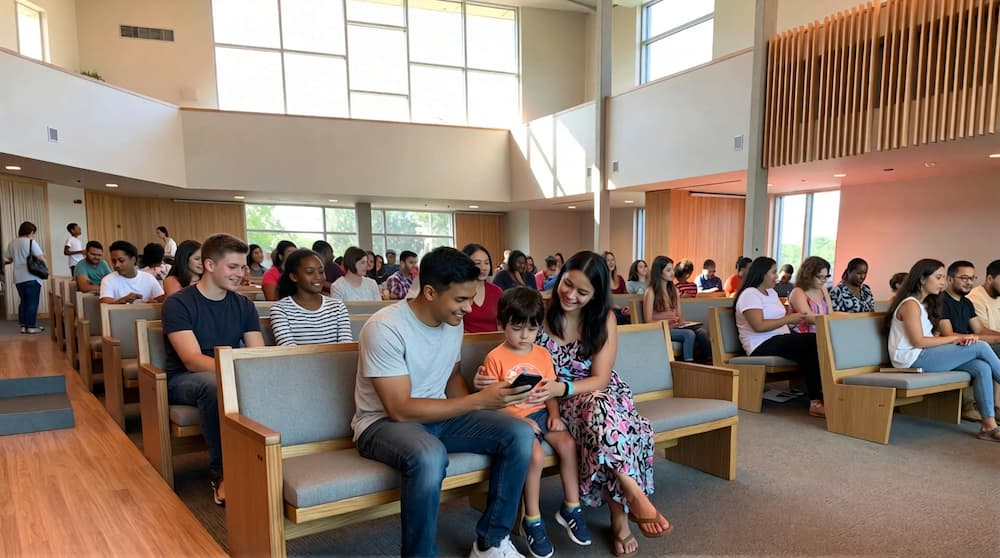12 Church Budgeting Tips You Didn’t Already Know (with a free church budget example)
Whether you're a small church just starting out or a well-established congregation, the tips in this blog post are like a financial GPS – guiding you towards stability, transparency, and a Jesus-centered budget!
.jpeg)
If you’re in church leadership, you may love pastoring church members, managing ministries, and teaching the Word of God. But managing the church budget? Maybe not so much.
The truth is, managing your church's finances can feel like walking a tightrope while juggling. You've got to keep everything in balance – the church income, payroll for staff members, additional expenditures (like mortgage payments), unexpected church needs, and, of course, the big, God-sized dreams that require big funding. A church budget is not just about numbers and spreadsheets; it's about fueling the passion and purpose of your church community.
So, how do you make sure that your financial roadmap is not only smart but also aligns with your church’s vision and mission (not to mention meets the criteria for Biblical stewardship)?
That's where these 12 budgeting tips come in. We're going to dive into some practical, easy-to-implement strategies that will help your church stay financially healthy without losing its focus on Jesus.
Whether you're a small church just starting out or a well-established congregation, these tips are like a financial GPS – guiding you towards stability, transparency, and a Jesus-centered budget!
12 Budgeting Tips for a Healthy Church
The budgeting process for a church doesn’t have to be difficult, but it does have to be thorough. To make sure your church budget is sound, pay attention to the following 12 tips.
1. Pray
For all the animals of the forest are mine, and I own the cattle on a thousand hills. Psalm 50:10
Don’t forget to pray before beginning the budgeting process. Remember that any income that comes into your church is God’s money; it’s up to you to choose to wisely steward His resources. Bringing God into the church budget can ensure that your heart and mind are set on Christ throughout the process.
2. Establish Clear Financial Goals
Before creating a budget, it's important to establish clear financial goals. What does the church aim to achieve in the next year or five years? These goals might include expanding outreach and evangelism programs, renovating church facilities, or growing missionary support. Or, you may even aim to create additional income streams (like starting a coffee shop or selling merchandise) to help you increase your financial health.
Ultimately, having specific goals helps in allocating resources more effectively. When you know where you'd like to be headed as a community, you can make better decisions about the type of budget you need.
3. Accurate Income Assessment
Churches mainly rely on tithes, offerings, and sometimes external donations as sources of income. Accurately assessing expected income is vital, and is typically done by looking at the last year. The previous year can give you an accurate look at your administration costs and operating expenses, while also providing an idea of how tithes and offerings ebb and flow throughout the year.
While past trends can be a good indicator, also consider potential changes like membership growth or economic downturns in the next year.
4. Prioritize Spending
Not all expenses are equal. Prioritize spending based on the church's goals and needs. Essential expenses like utility bills, staff salaries, and maintenance costs should be prioritized over less critical projects. Once your church can meet its basic costs, then you can focus on larger fundraising goals–like acquiring a new building, making a renovation, or hiring new church staff members.
5. Create a Line-Item Budget
Start by listing all your income sources – from tithes and offerings to fundraising events and rentals. Then, detail your expenses, breaking them down into specific categories like salaries, utility bills, and program funding. This granular approach helps you assign precise funds to each area, ensuring you cover your essentials while also planning for growth and new ventures.
Remember, a budget is a living document, so it's important to regularly track and adjust your spending as needed, keeping in line with your church's financial health and goals.
6. Involve Key Stakeholders
Budgeting should be a transparent process involving key stakeholders. This includes church leaders, financial committees, and sometimes, church members. Getting input from different perspectives can lead to a more balanced budget and lend your church a greater degree of credibility and transparency.
Free online giving tools for your church
Tithely provides the best online tools to help you increase generosity, manage your church, and engage your church members.
Sign Up Free
7. Plan for Emergencies
An emergency fund is crucial. Set aside a portion of the budget for unexpected expenses such as urgent repairs or support for community crises. This helps in managing unforeseen financial challenges without disrupting regular operations.
8. Regular Financial Reviews
Healthy financial management requires that you regularly review and adjust the budget. This could be on a quarterly or semi-annual basis for the current year. It allows the church to adapt to changing financial circumstances and ensures that spending aligns with goals for church growth.
9. Embrace Technology
Use technology for efficient budgeting. Various software tools can help in tracking income and expenses, generating financial reports, and even managing online giving.
10. Educate the Congregation
Educate the congregation about the church's financial needs and goals. Transparency in finances can encourage more consistent giving and support from the church community.
11. Focus on Long-term Investments
One thing to consider in your budget is investment with long-term benefits. For instance, investing in energy-efficient equipment can reduce utility costs over time. Or, consider creative ways to lower your mortgage payments.
12. Legal and Tax Compliance
Ensure legal and tax compliance. This includes proper record-keeping, adhering to financial regulations, and meeting reporting requirements. This not only ensures legality but also maintains the church’s credibility as a non-profit organization.
Church Budget Example
Sample Church Budget for the Fiscal Year 2024
Income
- Tithes and Offerings: $120,000
- Fundraising Events: $30,000
- Rental Income (Facilities Usage): $10,000
- Special Donations: $5,000
- Other Income (Books, CDs, etc.): $3,000
- Total Income: $168,000
Expenses
1.Personnel Costs:
- Salaries (Pastor, Staff): $80,000
- Benefits (Health, Retirement): $20,000
2.Facility Costs:
- Mortgage/Rent: $24,000
- Utilities (Electricity, Water, Internet): $12,000
- Maintenance and Repairs: $8,000
3.Ministry Expenses:
- Children’s Ministry: $5,000
- Youth Ministry: $5,000
- Outreach Programs: $7,000
4.Administrative Costs:
- Office Supplies: $2,000
- Software Subscriptions: $1,500
- Insurance: $3,500
5.Miscellaneous:
- Contingency Fund: $5,000
- Special Events: $3,000
- Miscellaneous: $2,000
- Total Expenses: $178,000
Summary
- Total Income: $168,000
- Total Expenses: $178,000
- Net Operating Income/Loss: -$10,000
This sample budget reflects a hypothetical scenario where a local church is operating at a deficit. This could prompt discussions on reducing church expenses, finding new income sources, or other financial strategies. The budget also includes a contingency fund for unexpected expenses, emphasizing the importance of planning for unforeseen circumstances.
Over to You
Effective budgeting is fundamental for the financial health and success of any church. It’s also a good reflection of a church’s integrity and commitment to Biblical stewardship. By following these 12 tips, churches can manage their finances responsibly, meet their obligations, and pave the way for future growth and development.
Finally, don’t miss out on additional free resources that can help your church grow in the practice of healthy budgeting. To download our free guide on effective church budgeting, click here.
Sign Up for Product Updates
If you’re in church leadership, you may love pastoring church members, managing ministries, and teaching the Word of God. But managing the church budget? Maybe not so much.
The truth is, managing your church's finances can feel like walking a tightrope while juggling. You've got to keep everything in balance – the church income, payroll for staff members, additional expenditures (like mortgage payments), unexpected church needs, and, of course, the big, God-sized dreams that require big funding. A church budget is not just about numbers and spreadsheets; it's about fueling the passion and purpose of your church community.
So, how do you make sure that your financial roadmap is not only smart but also aligns with your church’s vision and mission (not to mention meets the criteria for Biblical stewardship)?
That's where these 12 budgeting tips come in. We're going to dive into some practical, easy-to-implement strategies that will help your church stay financially healthy without losing its focus on Jesus.
Whether you're a small church just starting out or a well-established congregation, these tips are like a financial GPS – guiding you towards stability, transparency, and a Jesus-centered budget!
12 Budgeting Tips for a Healthy Church
The budgeting process for a church doesn’t have to be difficult, but it does have to be thorough. To make sure your church budget is sound, pay attention to the following 12 tips.
1. Pray
For all the animals of the forest are mine, and I own the cattle on a thousand hills. Psalm 50:10
Don’t forget to pray before beginning the budgeting process. Remember that any income that comes into your church is God’s money; it’s up to you to choose to wisely steward His resources. Bringing God into the church budget can ensure that your heart and mind are set on Christ throughout the process.
2. Establish Clear Financial Goals
Before creating a budget, it's important to establish clear financial goals. What does the church aim to achieve in the next year or five years? These goals might include expanding outreach and evangelism programs, renovating church facilities, or growing missionary support. Or, you may even aim to create additional income streams (like starting a coffee shop or selling merchandise) to help you increase your financial health.
Ultimately, having specific goals helps in allocating resources more effectively. When you know where you'd like to be headed as a community, you can make better decisions about the type of budget you need.
3. Accurate Income Assessment
Churches mainly rely on tithes, offerings, and sometimes external donations as sources of income. Accurately assessing expected income is vital, and is typically done by looking at the last year. The previous year can give you an accurate look at your administration costs and operating expenses, while also providing an idea of how tithes and offerings ebb and flow throughout the year.
While past trends can be a good indicator, also consider potential changes like membership growth or economic downturns in the next year.
4. Prioritize Spending
Not all expenses are equal. Prioritize spending based on the church's goals and needs. Essential expenses like utility bills, staff salaries, and maintenance costs should be prioritized over less critical projects. Once your church can meet its basic costs, then you can focus on larger fundraising goals–like acquiring a new building, making a renovation, or hiring new church staff members.
5. Create a Line-Item Budget
Start by listing all your income sources – from tithes and offerings to fundraising events and rentals. Then, detail your expenses, breaking them down into specific categories like salaries, utility bills, and program funding. This granular approach helps you assign precise funds to each area, ensuring you cover your essentials while also planning for growth and new ventures.
Remember, a budget is a living document, so it's important to regularly track and adjust your spending as needed, keeping in line with your church's financial health and goals.
6. Involve Key Stakeholders
Budgeting should be a transparent process involving key stakeholders. This includes church leaders, financial committees, and sometimes, church members. Getting input from different perspectives can lead to a more balanced budget and lend your church a greater degree of credibility and transparency.
Free online giving tools for your church
Tithely provides the best online tools to help you increase generosity, manage your church, and engage your church members.
Sign Up Free
7. Plan for Emergencies
An emergency fund is crucial. Set aside a portion of the budget for unexpected expenses such as urgent repairs or support for community crises. This helps in managing unforeseen financial challenges without disrupting regular operations.
8. Regular Financial Reviews
Healthy financial management requires that you regularly review and adjust the budget. This could be on a quarterly or semi-annual basis for the current year. It allows the church to adapt to changing financial circumstances and ensures that spending aligns with goals for church growth.
9. Embrace Technology
Use technology for efficient budgeting. Various software tools can help in tracking income and expenses, generating financial reports, and even managing online giving.
10. Educate the Congregation
Educate the congregation about the church's financial needs and goals. Transparency in finances can encourage more consistent giving and support from the church community.
11. Focus on Long-term Investments
One thing to consider in your budget is investment with long-term benefits. For instance, investing in energy-efficient equipment can reduce utility costs over time. Or, consider creative ways to lower your mortgage payments.
12. Legal and Tax Compliance
Ensure legal and tax compliance. This includes proper record-keeping, adhering to financial regulations, and meeting reporting requirements. This not only ensures legality but also maintains the church’s credibility as a non-profit organization.
Church Budget Example
Sample Church Budget for the Fiscal Year 2024
Income
- Tithes and Offerings: $120,000
- Fundraising Events: $30,000
- Rental Income (Facilities Usage): $10,000
- Special Donations: $5,000
- Other Income (Books, CDs, etc.): $3,000
- Total Income: $168,000
Expenses
1.Personnel Costs:
- Salaries (Pastor, Staff): $80,000
- Benefits (Health, Retirement): $20,000
2.Facility Costs:
- Mortgage/Rent: $24,000
- Utilities (Electricity, Water, Internet): $12,000
- Maintenance and Repairs: $8,000
3.Ministry Expenses:
- Children’s Ministry: $5,000
- Youth Ministry: $5,000
- Outreach Programs: $7,000
4.Administrative Costs:
- Office Supplies: $2,000
- Software Subscriptions: $1,500
- Insurance: $3,500
5.Miscellaneous:
- Contingency Fund: $5,000
- Special Events: $3,000
- Miscellaneous: $2,000
- Total Expenses: $178,000
Summary
- Total Income: $168,000
- Total Expenses: $178,000
- Net Operating Income/Loss: -$10,000
This sample budget reflects a hypothetical scenario where a local church is operating at a deficit. This could prompt discussions on reducing church expenses, finding new income sources, or other financial strategies. The budget also includes a contingency fund for unexpected expenses, emphasizing the importance of planning for unforeseen circumstances.
Over to You
Effective budgeting is fundamental for the financial health and success of any church. It’s also a good reflection of a church’s integrity and commitment to Biblical stewardship. By following these 12 tips, churches can manage their finances responsibly, meet their obligations, and pave the way for future growth and development.
Finally, don’t miss out on additional free resources that can help your church grow in the practice of healthy budgeting. To download our free guide on effective church budgeting, click here.
podcast transcript
If you’re in church leadership, you may love pastoring church members, managing ministries, and teaching the Word of God. But managing the church budget? Maybe not so much.
The truth is, managing your church's finances can feel like walking a tightrope while juggling. You've got to keep everything in balance – the church income, payroll for staff members, additional expenditures (like mortgage payments), unexpected church needs, and, of course, the big, God-sized dreams that require big funding. A church budget is not just about numbers and spreadsheets; it's about fueling the passion and purpose of your church community.
So, how do you make sure that your financial roadmap is not only smart but also aligns with your church’s vision and mission (not to mention meets the criteria for Biblical stewardship)?
That's where these 12 budgeting tips come in. We're going to dive into some practical, easy-to-implement strategies that will help your church stay financially healthy without losing its focus on Jesus.
Whether you're a small church just starting out or a well-established congregation, these tips are like a financial GPS – guiding you towards stability, transparency, and a Jesus-centered budget!
12 Budgeting Tips for a Healthy Church
The budgeting process for a church doesn’t have to be difficult, but it does have to be thorough. To make sure your church budget is sound, pay attention to the following 12 tips.
1. Pray
For all the animals of the forest are mine, and I own the cattle on a thousand hills. Psalm 50:10
Don’t forget to pray before beginning the budgeting process. Remember that any income that comes into your church is God’s money; it’s up to you to choose to wisely steward His resources. Bringing God into the church budget can ensure that your heart and mind are set on Christ throughout the process.
2. Establish Clear Financial Goals
Before creating a budget, it's important to establish clear financial goals. What does the church aim to achieve in the next year or five years? These goals might include expanding outreach and evangelism programs, renovating church facilities, or growing missionary support. Or, you may even aim to create additional income streams (like starting a coffee shop or selling merchandise) to help you increase your financial health.
Ultimately, having specific goals helps in allocating resources more effectively. When you know where you'd like to be headed as a community, you can make better decisions about the type of budget you need.
3. Accurate Income Assessment
Churches mainly rely on tithes, offerings, and sometimes external donations as sources of income. Accurately assessing expected income is vital, and is typically done by looking at the last year. The previous year can give you an accurate look at your administration costs and operating expenses, while also providing an idea of how tithes and offerings ebb and flow throughout the year.
While past trends can be a good indicator, also consider potential changes like membership growth or economic downturns in the next year.
4. Prioritize Spending
Not all expenses are equal. Prioritize spending based on the church's goals and needs. Essential expenses like utility bills, staff salaries, and maintenance costs should be prioritized over less critical projects. Once your church can meet its basic costs, then you can focus on larger fundraising goals–like acquiring a new building, making a renovation, or hiring new church staff members.
5. Create a Line-Item Budget
Start by listing all your income sources – from tithes and offerings to fundraising events and rentals. Then, detail your expenses, breaking them down into specific categories like salaries, utility bills, and program funding. This granular approach helps you assign precise funds to each area, ensuring you cover your essentials while also planning for growth and new ventures.
Remember, a budget is a living document, so it's important to regularly track and adjust your spending as needed, keeping in line with your church's financial health and goals.
6. Involve Key Stakeholders
Budgeting should be a transparent process involving key stakeholders. This includes church leaders, financial committees, and sometimes, church members. Getting input from different perspectives can lead to a more balanced budget and lend your church a greater degree of credibility and transparency.
Free online giving tools for your church
Tithely provides the best online tools to help you increase generosity, manage your church, and engage your church members.
Sign Up Free
7. Plan for Emergencies
An emergency fund is crucial. Set aside a portion of the budget for unexpected expenses such as urgent repairs or support for community crises. This helps in managing unforeseen financial challenges without disrupting regular operations.
8. Regular Financial Reviews
Healthy financial management requires that you regularly review and adjust the budget. This could be on a quarterly or semi-annual basis for the current year. It allows the church to adapt to changing financial circumstances and ensures that spending aligns with goals for church growth.
9. Embrace Technology
Use technology for efficient budgeting. Various software tools can help in tracking income and expenses, generating financial reports, and even managing online giving.
10. Educate the Congregation
Educate the congregation about the church's financial needs and goals. Transparency in finances can encourage more consistent giving and support from the church community.
11. Focus on Long-term Investments
One thing to consider in your budget is investment with long-term benefits. For instance, investing in energy-efficient equipment can reduce utility costs over time. Or, consider creative ways to lower your mortgage payments.
12. Legal and Tax Compliance
Ensure legal and tax compliance. This includes proper record-keeping, adhering to financial regulations, and meeting reporting requirements. This not only ensures legality but also maintains the church’s credibility as a non-profit organization.
Church Budget Example
Sample Church Budget for the Fiscal Year 2024
Income
- Tithes and Offerings: $120,000
- Fundraising Events: $30,000
- Rental Income (Facilities Usage): $10,000
- Special Donations: $5,000
- Other Income (Books, CDs, etc.): $3,000
- Total Income: $168,000
Expenses
1.Personnel Costs:
- Salaries (Pastor, Staff): $80,000
- Benefits (Health, Retirement): $20,000
2.Facility Costs:
- Mortgage/Rent: $24,000
- Utilities (Electricity, Water, Internet): $12,000
- Maintenance and Repairs: $8,000
3.Ministry Expenses:
- Children’s Ministry: $5,000
- Youth Ministry: $5,000
- Outreach Programs: $7,000
4.Administrative Costs:
- Office Supplies: $2,000
- Software Subscriptions: $1,500
- Insurance: $3,500
5.Miscellaneous:
- Contingency Fund: $5,000
- Special Events: $3,000
- Miscellaneous: $2,000
- Total Expenses: $178,000
Summary
- Total Income: $168,000
- Total Expenses: $178,000
- Net Operating Income/Loss: -$10,000
This sample budget reflects a hypothetical scenario where a local church is operating at a deficit. This could prompt discussions on reducing church expenses, finding new income sources, or other financial strategies. The budget also includes a contingency fund for unexpected expenses, emphasizing the importance of planning for unforeseen circumstances.
Over to You
Effective budgeting is fundamental for the financial health and success of any church. It’s also a good reflection of a church’s integrity and commitment to Biblical stewardship. By following these 12 tips, churches can manage their finances responsibly, meet their obligations, and pave the way for future growth and development.
Finally, don’t miss out on additional free resources that can help your church grow in the practice of healthy budgeting. To download our free guide on effective church budgeting, click here.
VIDEO transcript
If you’re in church leadership, you may love pastoring church members, managing ministries, and teaching the Word of God. But managing the church budget? Maybe not so much.
The truth is, managing your church's finances can feel like walking a tightrope while juggling. You've got to keep everything in balance – the church income, payroll for staff members, additional expenditures (like mortgage payments), unexpected church needs, and, of course, the big, God-sized dreams that require big funding. A church budget is not just about numbers and spreadsheets; it's about fueling the passion and purpose of your church community.
So, how do you make sure that your financial roadmap is not only smart but also aligns with your church’s vision and mission (not to mention meets the criteria for Biblical stewardship)?
That's where these 12 budgeting tips come in. We're going to dive into some practical, easy-to-implement strategies that will help your church stay financially healthy without losing its focus on Jesus.
Whether you're a small church just starting out or a well-established congregation, these tips are like a financial GPS – guiding you towards stability, transparency, and a Jesus-centered budget!
12 Budgeting Tips for a Healthy Church
The budgeting process for a church doesn’t have to be difficult, but it does have to be thorough. To make sure your church budget is sound, pay attention to the following 12 tips.
1. Pray
For all the animals of the forest are mine, and I own the cattle on a thousand hills. Psalm 50:10
Don’t forget to pray before beginning the budgeting process. Remember that any income that comes into your church is God’s money; it’s up to you to choose to wisely steward His resources. Bringing God into the church budget can ensure that your heart and mind are set on Christ throughout the process.
2. Establish Clear Financial Goals
Before creating a budget, it's important to establish clear financial goals. What does the church aim to achieve in the next year or five years? These goals might include expanding outreach and evangelism programs, renovating church facilities, or growing missionary support. Or, you may even aim to create additional income streams (like starting a coffee shop or selling merchandise) to help you increase your financial health.
Ultimately, having specific goals helps in allocating resources more effectively. When you know where you'd like to be headed as a community, you can make better decisions about the type of budget you need.
3. Accurate Income Assessment
Churches mainly rely on tithes, offerings, and sometimes external donations as sources of income. Accurately assessing expected income is vital, and is typically done by looking at the last year. The previous year can give you an accurate look at your administration costs and operating expenses, while also providing an idea of how tithes and offerings ebb and flow throughout the year.
While past trends can be a good indicator, also consider potential changes like membership growth or economic downturns in the next year.
4. Prioritize Spending
Not all expenses are equal. Prioritize spending based on the church's goals and needs. Essential expenses like utility bills, staff salaries, and maintenance costs should be prioritized over less critical projects. Once your church can meet its basic costs, then you can focus on larger fundraising goals–like acquiring a new building, making a renovation, or hiring new church staff members.
5. Create a Line-Item Budget
Start by listing all your income sources – from tithes and offerings to fundraising events and rentals. Then, detail your expenses, breaking them down into specific categories like salaries, utility bills, and program funding. This granular approach helps you assign precise funds to each area, ensuring you cover your essentials while also planning for growth and new ventures.
Remember, a budget is a living document, so it's important to regularly track and adjust your spending as needed, keeping in line with your church's financial health and goals.
6. Involve Key Stakeholders
Budgeting should be a transparent process involving key stakeholders. This includes church leaders, financial committees, and sometimes, church members. Getting input from different perspectives can lead to a more balanced budget and lend your church a greater degree of credibility and transparency.
Free online giving tools for your church
Tithely provides the best online tools to help you increase generosity, manage your church, and engage your church members.
Sign Up Free
7. Plan for Emergencies
An emergency fund is crucial. Set aside a portion of the budget for unexpected expenses such as urgent repairs or support for community crises. This helps in managing unforeseen financial challenges without disrupting regular operations.
8. Regular Financial Reviews
Healthy financial management requires that you regularly review and adjust the budget. This could be on a quarterly or semi-annual basis for the current year. It allows the church to adapt to changing financial circumstances and ensures that spending aligns with goals for church growth.
9. Embrace Technology
Use technology for efficient budgeting. Various software tools can help in tracking income and expenses, generating financial reports, and even managing online giving.
10. Educate the Congregation
Educate the congregation about the church's financial needs and goals. Transparency in finances can encourage more consistent giving and support from the church community.
11. Focus on Long-term Investments
One thing to consider in your budget is investment with long-term benefits. For instance, investing in energy-efficient equipment can reduce utility costs over time. Or, consider creative ways to lower your mortgage payments.
12. Legal and Tax Compliance
Ensure legal and tax compliance. This includes proper record-keeping, adhering to financial regulations, and meeting reporting requirements. This not only ensures legality but also maintains the church’s credibility as a non-profit organization.
Church Budget Example
Sample Church Budget for the Fiscal Year 2024
Income
- Tithes and Offerings: $120,000
- Fundraising Events: $30,000
- Rental Income (Facilities Usage): $10,000
- Special Donations: $5,000
- Other Income (Books, CDs, etc.): $3,000
- Total Income: $168,000
Expenses
1.Personnel Costs:
- Salaries (Pastor, Staff): $80,000
- Benefits (Health, Retirement): $20,000
2.Facility Costs:
- Mortgage/Rent: $24,000
- Utilities (Electricity, Water, Internet): $12,000
- Maintenance and Repairs: $8,000
3.Ministry Expenses:
- Children’s Ministry: $5,000
- Youth Ministry: $5,000
- Outreach Programs: $7,000
4.Administrative Costs:
- Office Supplies: $2,000
- Software Subscriptions: $1,500
- Insurance: $3,500
5.Miscellaneous:
- Contingency Fund: $5,000
- Special Events: $3,000
- Miscellaneous: $2,000
- Total Expenses: $178,000
Summary
- Total Income: $168,000
- Total Expenses: $178,000
- Net Operating Income/Loss: -$10,000
This sample budget reflects a hypothetical scenario where a local church is operating at a deficit. This could prompt discussions on reducing church expenses, finding new income sources, or other financial strategies. The budget also includes a contingency fund for unexpected expenses, emphasizing the importance of planning for unforeseen circumstances.
Over to You
Effective budgeting is fundamental for the financial health and success of any church. It’s also a good reflection of a church’s integrity and commitment to Biblical stewardship. By following these 12 tips, churches can manage their finances responsibly, meet their obligations, and pave the way for future growth and development.
Finally, don’t miss out on additional free resources that can help your church grow in the practice of healthy budgeting. To download our free guide on effective church budgeting, click here.



























